Captain’s Log 24/01/17 12:36
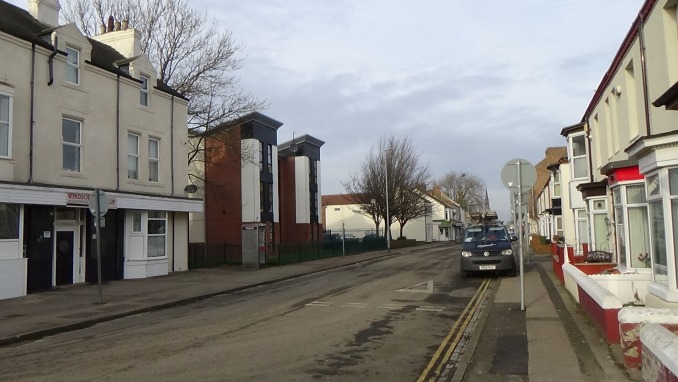
I’m walking down Bowesfield Lane in Stockton, looking for a place to knock. Yesterday, I went to Kingston Road where Channel 4 shot Benefits Street; I found 2 people out of the 5 I was looking for, then walked around for 3 hours in the freezing cold. This has never happened to me before. There’s a chance the residents were afraid I was from the press, but I want to know for sure. More importantly, I need to find 3 more people to write for, otherwise I’ve failed for the first time ever. So I’ve decided to conduct an experiment: I’m going to do exactly what I did yesterday, this time in a place that isn’t famous. I need a street that’s similar to what Kingston Road used to look like. Without putting too fine a point on this, I’m looking for somewhere a bit rough.
–
 After a few minutes, I pass Park Field Way, a line of yellow terraced houses with tiny little windows in them. I decide I’m going to start here. But I’m now nervous for the first time since I’ve come to Stockton. See, yesterday, the whole area had this kind of familiar quality; I’d already seen it on TV, I knew what to expect. But there is no familiar quality here, no character profiles to make me feel reassured. I’m stepping back into the unknown.
After a few minutes, I pass Park Field Way, a line of yellow terraced houses with tiny little windows in them. I decide I’m going to start here. But I’m now nervous for the first time since I’ve come to Stockton. See, yesterday, the whole area had this kind of familiar quality; I’d already seen it on TV, I knew what to expect. But there is no familiar quality here, no character profiles to make me feel reassured. I’m stepping back into the unknown.
As I head down Park Field Way, I see the street winds through an estate that’s tucked behind Bowesfield Lane. I walk all the way along it, looking for number 1 (my usual first stop). I can’t find it anywhere. There’s a number 6… That’s probably close enough. I go over and knock, there’s no answer. After a few more doors, I try one with a sign on it that says: ‘Beware! Jack Russell Inside’. A woman sticks her head out of an upstairs window and says she’s not interested. 7 doors later, an African lady comes out.
“Art project? What kind of art?” she says.
“Have you got a minute, I’ll explain.”
“I’m very busy,” she says, shaking her head.
What makes the scene so much weirder is that the estate is right next to a school. It must be dinner time and, as the kids run around in the yard, feel-good music is being blasted at top volume. The entire journey up the street is soundtracked by tunes like ‘I’m Yours’ by Jason Mraz, giving the whole experience a sort of happy-go-lucky, Disney film vibe, as the occasional resident opens the door and eyes me suspiciously. But not even the bland, vaguely soothing sounds of Jason Mraz can mask my growing fear: This is exactly what happened to me yesterday. What if this isn’t about the media at all? What if this just isn’t going to work in Stockton?
 It’s been an hour and there hasn’t been a single taker. I head across the road to Bramley Parade, hoping my luck changes. A ginger cat comes over to me. It rubs its face on my legs (which means I’m now technically its property). It starts to follow me as I go from door-to-door. In fact, after a few houses, it actually starts to take the lead, going to the next place before me. Maybe this will help? People love animals, even if they don’t like poetry. We might become a double act. They’d make a Hollywood film about us, like that one about the Big Issue seller. But, in the end, the cat doesn’t seem to make a difference. A couple of middle-aged men answer and turn me down. We go our separate ways when the cat decides to sit on a wheelie bin, taking an impromptu and unnecessary break.
It’s been an hour and there hasn’t been a single taker. I head across the road to Bramley Parade, hoping my luck changes. A ginger cat comes over to me. It rubs its face on my legs (which means I’m now technically its property). It starts to follow me as I go from door-to-door. In fact, after a few houses, it actually starts to take the lead, going to the next place before me. Maybe this will help? People love animals, even if they don’t like poetry. We might become a double act. They’d make a Hollywood film about us, like that one about the Big Issue seller. But, in the end, the cat doesn’t seem to make a difference. A couple of middle-aged men answer and turn me down. We go our separate ways when the cat decides to sit on a wheelie bin, taking an impromptu and unnecessary break.
At the second last house on the street, a woman comes to the door. She’s got red spikey hair and she’s smoking a cigarette. She laughs at the poem. YES. Nothing can describe quite how amazing this feels. After 3 hours of trying yesterday and 1 hour today, to hear someone who actually enjoys it, it’s a real buzz. Her name is Jayne. I ask her what’s important to her.
“I was just watching the horse racing,” she says. “You could do me a poem about that.” I tell her I’d love to. But there’s one problem: I don’t know a single thing about horse racing. “Why don’t you come in?” she says. YES. This is what I remember Door-to-Door Poetry being like. This is how it’s meant to go. I’d spent so long getting knocked back, I’d nearly forgot about this bit.
–
 The front door leads straight into the sitting room.
The front door leads straight into the sitting room.
“You’ll have to excuse the mess,” she says, moving a blanket on the sofa so I can sit down. There’s two budgies in a cage, a horse race is playing on a laptop. Jayne offers me a cup of tea. We walk into the kitchen and I meet her cats, Thomas, Garfield and Tabatha. Tea in hand, we sit back down.
“So what do you like about horse racing?” I ask.
“I just like horses. As you can tell,” she says, smiling and gesturing to the walls. I suddenly notice the incredible amount of ceramic horses on the shelves and mantles; horse after horse, all in varying degrees of shape, size and colour.
–
 “In football,” I say, “there’s historical moments. David Beckham scoring from the halfway line and stuff. Are there any defining moments in horse racing?”
“In football,” I say, “there’s historical moments. David Beckham scoring from the halfway line and stuff. Are there any defining moments in horse racing?”
“Well, you’ve got a lot of great horses,” Jayne says. “There’s Red Rum. You must have heard of Red Rum?”
“Nope.”
“He’s one of the most famous race horses going!” Jayne says, in disbelief at my lack of equine racing knowledge. “He won the Grand National three times and was second twice. Do you want to see a painting of him?”
“Yeah!” She goes out of the room and comes back with a massive A2 picture of a horse’s face, with a smaller painting of a whole horse next to it. “That’s Red Rum there. It’s a bit broken cos one of the cats knocked it over.”
 After nearly an hour, I decide I should probably get moving. Being out of the cold with a warm cup of tea, it’s very tempting to stay and talk. But I need to find 2 more people. I ask Jayne if she can think of anyone to visit.
After nearly an hour, I decide I should probably get moving. Being out of the cold with a warm cup of tea, it’s very tempting to stay and talk. But I need to find 2 more people. I ask Jayne if she can think of anyone to visit.
“It’s quite rough around here,” she says. I explain how this is kind of the point, about the bad luck I had yesterday. “Go down Hartington Road,” she says. “Now that is a rough street.” Hartington Road’s reputation clearly precedes it. Dan at ARC Stockton has already mentioned it this morning, apparently it’s quite notorious for crime. Either way, all the signs seem to be pointing there. I make my goodbyes to Jayne. Stepping out the door, it feels really good to have been invited in for the first time in 4 hours. Maybe the winds are changing direction…
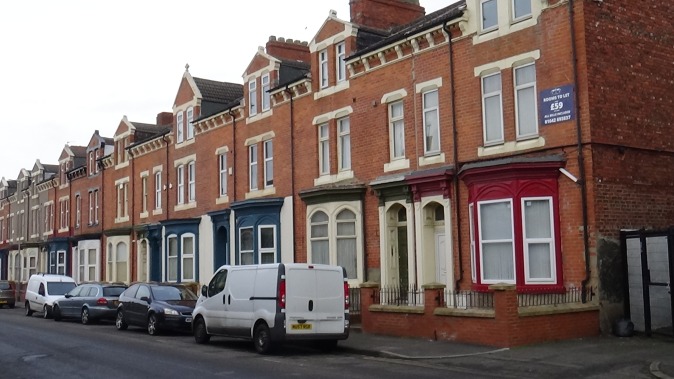
Hartington Road is about a 2 minute walk from Jayne’s. As I cross the traffic lights and walk on to it, I’m struck by how much of an incredibly odd street it is. The terraced houses are massive, Victorian-looking, red brick structures. At a glance, it looks really really posh: The windows are as big as the walls in my house, a lot of the doors are huge wooden ones with brass handles. But, if you look a bit closer, you spot the boarded-up openings, the young lady wheeling a mattress down the road in a shopping trolley. The whole place has a surreal kind of ‘fin de siècle’ quality about it.
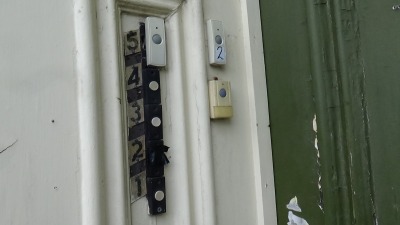 I try a few houses. A lot of these have been converted into flats and, because of the 3 storeys, they can fit about 5 flats in each building. Mismatched doorbells are littered up the sides of the walls. I wait in the same spot for 5 minutes at a time, ringing one bell, giving 40 or so seconds for someone to answer, then trying the next one. As I’m waiting outside, pressing buttons, a man comes behind me through a gate. He’s got thick rimmed glasses on and neat grey hair combed to the side. He reminds me a bit of Noam Chomsky.
I try a few houses. A lot of these have been converted into flats and, because of the 3 storeys, they can fit about 5 flats in each building. Mismatched doorbells are littered up the sides of the walls. I wait in the same spot for 5 minutes at a time, ringing one bell, giving 40 or so seconds for someone to answer, then trying the next one. As I’m waiting outside, pressing buttons, a man comes behind me through a gate. He’s got thick rimmed glasses on and neat grey hair combed to the side. He reminds me a bit of Noam Chomsky.
“Are you trying to get in touch with someone?” he asks, in a soft, polite voice.
“I’m doing an art project actually, do you live here?”
“Yes.” I do the poem and he seems to really enjoy it. His name is Boris. “You’re brave coming round here, aren’t you?” he says. “I love literature. Do you want to come inside?”
 To be fair, Boris isn’t the kind of person I was expecting to find here. And, heading inside, the flat isn’t exactly what I was expecting either. As we walk through the massive hallway, I feel like I’ve stepped into the 1890’s; the ceiling is miles away and has detailed floral coving along it; a huge oak banister curves around the staircase. He takes me up to the first floor and shows me into his sitting room, spotless and full of old wooden furniture. There’s a chair in the corner with a little writing desk, pots of ink and leather-bound diaries. He shows me his book collection; Chaucer, Dickens. I think I’m going to like it here.
To be fair, Boris isn’t the kind of person I was expecting to find here. And, heading inside, the flat isn’t exactly what I was expecting either. As we walk through the massive hallway, I feel like I’ve stepped into the 1890’s; the ceiling is miles away and has detailed floral coving along it; a huge oak banister curves around the staircase. He takes me up to the first floor and shows me into his sitting room, spotless and full of old wooden furniture. There’s a chair in the corner with a little writing desk, pots of ink and leather-bound diaries. He shows me his book collection; Chaucer, Dickens. I think I’m going to like it here.
I sit down on a big green chair in front of the writing desk. I ask Boris if I can record our conversation.
“Oh yes,” he says. “I used to have an old Phillips tape recorder. I’d record bird song.”
“Bird song is fascinating,” I say. “I think the more you listen to it, the more alien it starts to sound.”
“Well, scientifically, it’s for mating and establishing territory. But if you’re into more spiritual things.” He talks about how he was raised a Christian, “indoctrinated a bit” in school. “I’m 67, so you can imagine how far back that was.” But he has an interest in all kinds of religions; Islam, Hinduism, Chinese Buddhism. “The basic idea I’ve picked up over the years is to be decent to people and hope they’ll do the same thing for you. They don’t always, but I think it makes a difference when you treat them well.”
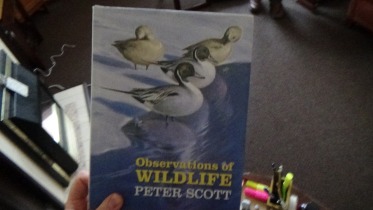 “So tell me what’s important to you, Boris,” I ask.
“So tell me what’s important to you, Boris,” I ask.
“Well… The biggest problem we’re facing is overpopulation.” It’s a big subject. I think it was David Attenborough who said we need to control our population or face extinction. “I’ll lend you this book,” he says, going over to the shelf. Observations of Wildlife by Peter Scott. “He had a lot to say about that kind of thing,” Boris explains. “His grandfather was Scott of the Antarctic.”
I mention a book I read a few years ago called Straw Dogs by John Gray. He compares the massive rise in the human population to a spike in the numbers of rats; when there’s food and space they’ll expand at an extraordinary rate. But, as soon as it runs out, the numbers plummet.
“If you’ve got an aggressive species, you’re going to get that,” Boris says.
“Do you think we’re an aggressive species?”
“I’ve been in a position where I can look and listen for a long time. And you’ve only got to turn on the news in an evening. You see what goes on and you wonder why. I think it’s the way we’ve developed.”
–
 “And maybe we’re a prototype,” Boris goes on. “If you think of an absent god, or you could call it an absent alien, who put this species on the planet. Are we just an experiment for something better in the future?”
“And maybe we’re a prototype,” Boris goes on. “If you think of an absent god, or you could call it an absent alien, who put this species on the planet. Are we just an experiment for something better in the future?”
“Is it so ingrained in our bodies that we can’t stop overpopulating and destroying the earth?” I ask. “Or are we intelligent enough to find a way around it?”
“I don’t think it’s possible. It’s just what we do. Everybody wants to do it, I did, I’ve got 4 children.” I mention that Gray describes the human race as one of the most intelligent and destructive animals on the planet. “I’ve often wondered how intelligent we really are, compared to elephants and whales,” Boris says. “I think what we need is this alien to come back,” he chuckles. “We need sorting out, don’t we?”
–
I’ve really enjoyed chatting to Boris, but I need to head off. As I’m picking up my bag, I notice one similar to it on the carpet nearby.
“I like your briefcase,” I say. Compared to mine, it’s worlds apart really, mine being scuffed and riddled with holes from a year of knocking in all conditions, including a muddy field. This one is shiny and new, it wouldn’t look out of place on a successful lawyer.
“I use it to keep paperwork in,” he says, lifting it up to show me. It’s kind of spooky, but I realise this is actually the exact briefcase I dreamed of finding when I was looking for mine, right down to the colour. It’s got multiple compartments in; it opens from the top, like something a doctor would have carried in the olden days. I imagine pulling poems out like prescriptions. Of course, I don’t mention this out loud.
 “You know what, you should have it,” Boris says, as if he’s read my mind.
“You know what, you should have it,” Boris says, as if he’s read my mind.
“Oh no, I couldn’t.” I mean I’ve literally just met him.
“You’ll get more use out of it than me,” he says. “Why don’t you have a go? Put your stuff in and see how it feels.”
“I’m sure it would be great. But it’s so nice, I couldn’t.”
“Well I got it from a charity shop, it was only five pounds. I tell you what, when you make a bit of money from your poetry, you can give me a fiver for it.” At this point, my politeness collapses under a tidal wave of bag envy.
“Deal,” I say. This is the best thing ever! I put my stuff in and try it out. It’s perfect.
We shake hands and I head downstairs, leaving Boris with my old, raggy briefcase. I’m a bit sad to let it go; it’s been with me through everything, the trip to Byker, to Glastonbury. It’s been my one constant in a world full of uncertain and mysterious doors. But this new bag symbolises something even more important. After the luck I’ve had the past few days, wondering whether the project is even going to work anymore, it’s a reminder that things can change for the better at any minute. This is beyond anything I ever hoped would happen to me here. As I walk down the street, I feel full of energy and open to any possibility. Just one more person to find.
 After a couple of houses, I knock on a big red door and a tall man with thinning black hair and very short shorts answers.
After a couple of houses, I knock on a big red door and a tall man with thinning black hair and very short shorts answers.
“There’s a bell!” he says. He sounds irritated, I don’t think poetry is going to help in this situation, but I try it anyway. Surprisingly, his face lights up. “You’re very good, aren’t you?” he says. His name is Maj. “So how rough is the estate you come from?” he asks, talking about a line in my poem.* “Is it rougher than here?”
“I don’t know, I haven’t been here very long really.”
“This is the roughest street in Stockton,” he says, in a matter-of-fact sort of way. I ask him what’s important. He invites me in.
Unlike many of the other places on the street, this is an actual house, not a set of flats. It must be massive inside. Maj leads me through the hallway and takes me into the sitting room. There’s cream walls and a bright red carpet, a drum made of animal skin. “This was a high end street in its time,” he says, sitting down on the sofa opposite me. “Only doctors and solicitors. I grew up here, there used to be an old woman next door. At the time she was about 85, but she was fit as a fiddle; she used to take us ice skating. She told us you could not walk down this street with high heels on. It was that posh.” Maj explains how it’s changed. “Now, everyone seems to think, ‘Hartington Road, I wouldn’t dare live there.’ You see on social media, when something’s happened, people say, ‘I could of guessed it would happen there.’ But fights can happen anywhere, ambulances can turn up anywhere.”
We talk about prejudice.
“I see it every day,” says Maj. “There’s hostels on this street now, for people who are addicts, who are homeless, who’ve come out of prison and don’t have anywhere to go. I look at these people and think, ‘Whose fault is it?’ Cos there’s some decent people there, I talk to them, some are very intelligent. But the majority say, ‘Look at those scumbags.’ I say, ‘Wait a minute, you don’t know their story. You don’t know what they’ve been through. Have they got a family? Have they got somebody to love?’ And the drugs end up taking over because they get comfort out of that. But if you look at the bigger story, whose fault is it really? It’s the government’s fault. Because there’s nothing here. There’s no jobs for them, the government are happy paying companies to store them like animals instead of investing in some work. Everywhere they go, the doors are closing. There’s no incentive.”
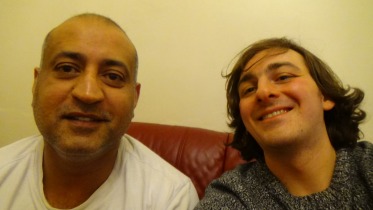 He tells me it’s important to trust people. “You’ve got to give somebody a chance. I’ve been there. I’m not feeling sorry for myself, but I’ve had a rough time. I’ve made mistakes. And I know what it’s like. Nobody wants to know you. But if someone gave you a chance and saw what skills you have… Like you, you’ve got skills, probably in a way that no one else has. You’re gifted from God.”
He tells me it’s important to trust people. “You’ve got to give somebody a chance. I’ve been there. I’m not feeling sorry for myself, but I’ve had a rough time. I’ve made mistakes. And I know what it’s like. Nobody wants to know you. But if someone gave you a chance and saw what skills you have… Like you, you’ve got skills, probably in a way that no one else has. You’re gifted from God.”
“Well, I don’t know about that.”
“You are. Not everybody can do what you do, not everybody can do what I do. Every individual is gifted in their own way.”
“That’s a beautiful way of looking at life,” I say.
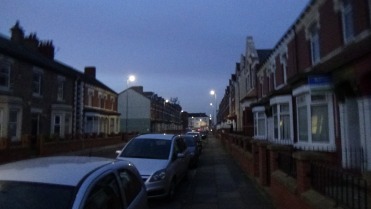 Maj asks me if I want to go out for a pint. It’s very tempting, but it’s getting late and I need to catch my train back to Newcastle. Knowing that I’ve just passed the finish line has left me feeling exhausted.
Maj asks me if I want to go out for a pint. It’s very tempting, but it’s getting late and I need to catch my train back to Newcastle. Knowing that I’ve just passed the finish line has left me feeling exhausted.
“It’s been really good talking to you,” Maj says, waving as I step out into the night. What an absolutely perfect way to end this trip to Stockton. These past couple of days have been a proper roller coaster. I’ve went from struggling to find anyone to even talk to, to meeting 3 people in a row who’ve invited me in and chatted to me for an hour at a time. I’m pretty confident I could have found more than the 5 people I was looking for on Hartington Road.
It’s been a learning curve as well. I’ve discovered that, if I go somewhere that’s famous, or has celebrities living there, there’s a much bigger chance people won’t get involved. I’ve got a glimpse of just how badly the project can go, which has made it even more exciting when it’s going well. And those I’ve met have been full of surprises too. On a street considered to be extremely rough, the people I’ve found broke all the stereotypes that go along with that. As well as this, they’ve had very important, incredible things to say and they’ve articulated them in such a moving way. As I look down at my new briefcase, it seems impossible to tell what people will be like anywhere you go. What if Maj is right, maybe everyone is unique? Maybe the only thing we can really count on is each person’s individuality and the endless possibilities behind every single door.
* I’m a Door-to-Door Poet
and my hair could be much neater.
But this could be worse,
I could be here to check the meter.
I won’t be going through your cupboards
trying to take a reading,
I just want to ask a question
that I hope you’ll find intriguing.
In school they taught me poetry’s bust,
wrote by toffs who’ve turned to dust
on country manors, deathly shrouds,
serious Lords and fluffy clouds.
I found it quite hard to relate.
I grew up on a rough estate,
walls thin as paper used to trace,
the clouds an endless shade of grey.
I’m here to make poetry exciting;
like bungee jumping but less frightening.
So I’m at your door to find
the subjects that flow through your mind.
Tell me about your life.
OK, maybe not the whole of it.
I’ll stick it in a poem or at least
have a decent go at it.
Maybe you heard a great story
you’d love to hear in rhyme.
Maybe your blood is boiling
from a recent council fine.
Maybe you dropped your iPhone 6
and it fell down the toilet.
I don’t know, I can’t decide
for you cos that would spoil it.
So cheers for listening to these verses,
I hope I got across my purpose.
Don’t slam the door, don’t be nervous,
the Door-to-Door Poet is at your service.
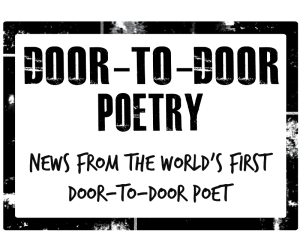
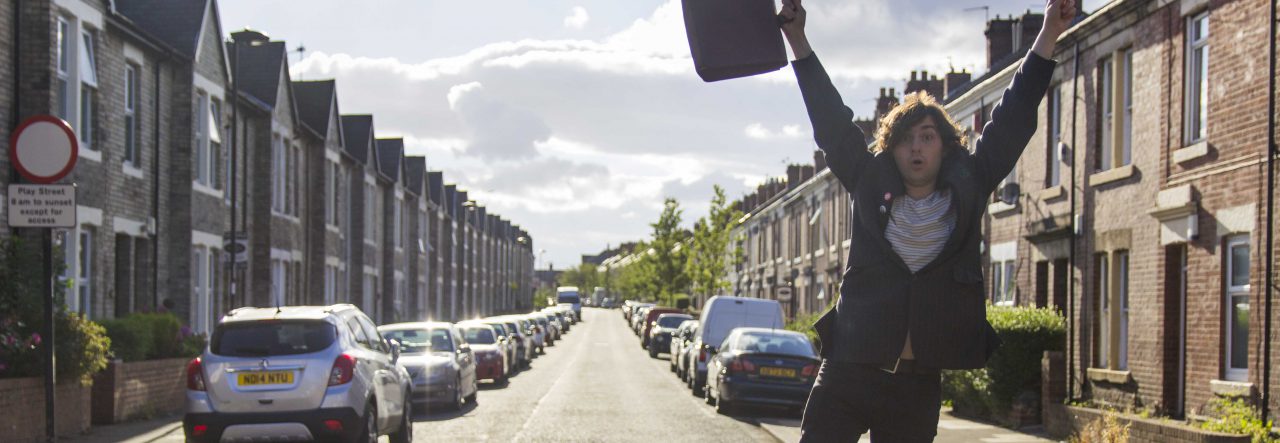
I saw you on BBC this morning – you’are doing an awesome job! All the best from Paris
LikeLike
I have just heard an item about your door to door poetry on R4 Today programme. It was so moving and such a wonderful idea. I hope you might think of coming here to the Scottish Borders with your door to door poetry. Keep going and bringing heart and hope to people everywhere.
LikeLike
I heard you on BBC on NPR in the US this morning and was very moved, thank you for being inspiring
LikeLike
Lovely.
LikeLike
Hello Rowan I feel I am there with you – I never know where your stories are going, I alternate between anxiety and knowing you are safe and a reassurance that there are people who will welcome you, care for you, share their time and enjoy your company. I am going to make some time to catch up with the rest of your wanderings and poems
LikeLike
Watched you on BBC Breakfast this morning.
An inspirational and moving way of making a difference.
Keep knocking on doors.
Yvonne F.
LikeLike
Pingback: Right Place, Wrong Time – Door-to-Door Poetry